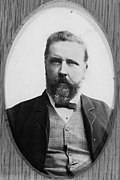Queensland state election, 1904
|
|
|||||||||||||||||||||||||||||||||
|---|---|---|---|---|---|---|---|---|---|---|---|---|---|---|---|---|---|---|---|---|---|---|---|---|---|---|---|---|---|---|---|---|---|
|
|
|||||||||||||||||||||||||||||||||
|
All 72 seats in the Legislative Assembly of Queensland |
|||||||||||||||||||||||||||||||||
|
|||||||||||||||||||||||||||||||||
|
|||||||||||||||||||||||||||||||||
Elections were held in the Australian state of Queensland on 27 August 1904 to elect the members of the state's Legislative Assembly. The Ministerial Party maintained government with the continued support of the Labour Party.
The elections were held on 27 August 1904.
Robert Philp had been Premier since December 1899, and had been re-elected at the 1902 election. On 9 September 1903, the government put a bill for taxation proposals to the assembly, which was passed by a narrow margin of only two votes (33–31). With several Ministerialists voting against the proposals, Philp moved to adjourn the assembly. The following day, Philp announced he could no longer govern with self-respect, and had tendered his resignation to the Governor, Sir Herbert Chermside. Labour leader William Browne was sent for, and endeavoured to form a ministry, but on 15 September informed the Governor that he had been unable to do so. On Browne's recommendation, the assembly's Speaker, Arthur Morgan, was sent for and commissioned to form a government.
On 7 June 1904, opposition member James Cribb rose as the last speaker in the address-in-reply to the Governor's speech, and raised an amendment which was a motion of no confidence in the Morgan ministry. Debate over the amendment continued for two weeks, with the vote taking place on 22 June. The amendment was not passed by one vote: 36 against, 35 for. Subsequently, Morgan tendered the resignation of himself and his ministry, recommending a dissolution of parliament. The Governor refused and sent for Robert Philp, who declined to resume the premiership, and announced that a caucus meeting of his party would elect a new leader. On 28 June, the Opposition caucus elected Sir Arthur Rutledge as its leader, and he was commissioned by the Governor to form government. On 7 July, Rutledge told the house he had returned the commission to the Governor, as he had been unable to form a ministry. Morgan and his ministers, who had remained in their positions until the appointment of their successors, again requested a dissolution which was granted.
...
Wikipedia



